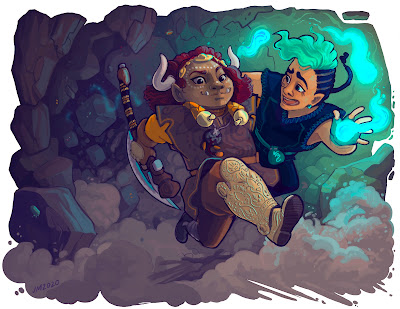The action economy of the CORE20 RPG has been designed to give characters and their foes a maximum amount of flexibility in determining what they do in any given round while the game is in initiative, and to make sure that players are able to make meaningful choices regarding the actions they can take each round. As with most parts of CORE20, if you’re familiar with any d20-based fantasy game, you already understand the basic setup of how things play out round by round while the game is in initiative. If you’re primarily familiar with 5e D&D, you’ll note some differences, though — which will actually make CORE20 that much more familiar to players of 3rd edition and 4th edition D&D.
Chapter 5 Excerpt (Player's Guide) — Action Economy Preview
As detailed in the preview, everything your character might do in the game can be accomplished as a standard action, a minor action, a move action, a free action, or a reaction. There are a number of regular activities in the game that are locked into specific action types. For example, making weapon attacks or casting a spell is always a standard action by default. Drinking a potion is always a minor action, as is first pulling that potion out of an accessible pocket, pouch, or bandolier. Moving your speed, or shifting half your speed to avoid opportunity attacks, is always a move action. But for the many, many other activities your character can attempt, the setup of standard action, minor action, and move action is meant to allow GMs and players to quickly decide on what type of action fits the activity best.
Making an Acrobatics check to slide down a bannister in the governor’s mansion? Because it involves movement, that’s a move action. Smashing a window open to jump through it while escaping a zombie horde? If the window is solid enough that smashing it takes most of your focus and attention, it’s a standard action. But if you can smash through it without needing to fully focus, a minor action is more appropriate — leaving you free to get off one last attack or spell before you flee.
The setup of actions in CORE20 is also designed to maximize your options for what your character can do while the game is in initiative. In most rounds, a character will use their standard action to make a weapon attack or cast a spell; use their minor action to make a quick skill check, grab up useful equipment, get the drop on their foes, or hold their turn; and use their move action to get into or out of position. But if you’ve got a reason to want to forgo that standard-action spell or attack in order to move twice on your turn, you can do so. If you want to give up your standard action to use a minor action instead, you can do that too. By forgoing your standard action and your move action, you can even take three minor actions on your turn if you want to — and there are many times in the game where doing so makes sense.
•
The initial part of this preview excerpt also talks about the way the game handles adjustments to your die rolls, which can take the form of bonuses, boons or banes, and advantage or disadvantage. Bonuses and advantage are familiar to anyone who’s played 5e D&D, while boons and banes are originally from the Shadow of the Demon Lord RPG by the amazing Robert J. Schwalb, and have been ported into CORE20 with Rob’s generous permission.
The final part of the preview then talks about action points — a mechanic that gives player characters an option to shift the balance of probability and fate in their direction just a little bit. Every character has one action point by default, granting the ability to take an extra move action or minor action, to convert a critical hit against them into a regular hit, to automatically stabilize while dying, and much more. But just as with everything else in CORE20, action points are gained by taking a feat — Heroic Action — letting you build a character whose adventuring exploits show off a legendary touch of good fortune.
(Art by Jackie Musto — http://www.jackiemustoart.com)


